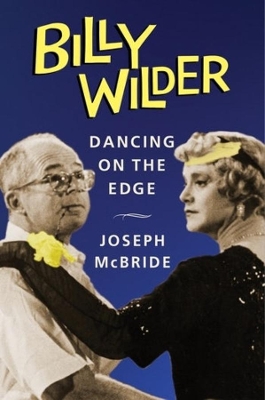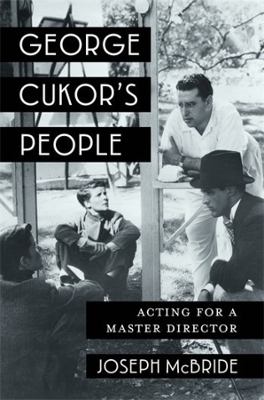Film and Culture
2 total works
The director and cowriter of some of the world's most iconic films—including Double Indemnity, Sunset Blvd., Some Like It Hot, and The Apartment—Billy Wilder earned acclaim as American cinema's greatest social satirist. Though an influential fixture in Hollywood, Wilder always saw himself as an outsider. His worldview was shaped by his background in the Austro-Hungarian Empire and work as a journalist in Berlin during Hitler's rise to power, and his perspective as a Jewish refugee from Nazism lent his films a sense of the peril that could engulf any society.
In this critical study, Joseph McBride offers new ways to understand Wilder's work, stretching from his days as a reporter and screenwriter in Europe to his distinguished as well as forgotten films as a Hollywood writer and his celebrated work as a writer-director. In contrast to the widespread view of Wilder as a hardened cynic, McBride reveals him to be a disappointed romantic. Wilder's experiences as an exile led him to mask his sensitivity beneath a veneer of wisecracking that made him a celebrated caustic wit. Amid the satirical barbs and exposure of social hypocrisies, Wilder’s films are marked by intense compassion and a profound understanding of the human condition.
Mixing biographical insight with in-depth analysis of films from throughout Wilder's career as a screenwriter and director of comedy and drama, and drawing on McBride's interviews with the director and his collaborators, this book casts new light on the full range of Wilder's rich, complex, and distinctive vision.
In this critical study, Joseph McBride offers new ways to understand Wilder's work, stretching from his days as a reporter and screenwriter in Europe to his distinguished as well as forgotten films as a Hollywood writer and his celebrated work as a writer-director. In contrast to the widespread view of Wilder as a hardened cynic, McBride reveals him to be a disappointed romantic. Wilder's experiences as an exile led him to mask his sensitivity beneath a veneer of wisecracking that made him a celebrated caustic wit. Amid the satirical barbs and exposure of social hypocrisies, Wilder’s films are marked by intense compassion and a profound understanding of the human condition.
Mixing biographical insight with in-depth analysis of films from throughout Wilder's career as a screenwriter and director of comedy and drama, and drawing on McBride's interviews with the director and his collaborators, this book casts new light on the full range of Wilder's rich, complex, and distinctive vision.
The director of classic films such as Sylvia Scarlett, The Philadelphia Story, Gaslight, Adam’s Rib, A Star Is Born, and My Fair Lady, George Cukor is widely admired but often misunderstood. Reductively stereotyped in his time as a “woman’s director”—a thinly veiled, disparaging code for “gay”—he brilliantly directed a wide range of iconic actors and actresses, including Cary Grant, Greta Garbo, Spencer Tracy, Joan Crawford, Marilyn Monroe, and Maggie Smith. As Katharine Hepburn, the star of ten Cukor films, told the director, “All the people in your pictures are as goddamned good as they can possibly be, and that’s your stamp.”
In this groundbreaking, lavishly illustrated critical study, Joseph McBride provides insightful and revealing essayistic portraits of Cukor’s actors in their most memorable roles. The queer filmmaker gravitated to socially adventurous, subversively rule-breaking, audacious dreamers who are often sexually transgressive and gender fluid in ways that seem strikingly modern today. McBride shows that Cukor’s seemingly self-effacing body of work is characterized by a discreet way of channeling his feelings through his actors. He expertly cajoled actors, usually gently but sometimes with bracing harshness, to delve deeply into emotional areas they tended to keep safely hidden. Cukor’s wry wit, his keen sense of psychological and social observation, his charm and irony, and his toughness and resilience kept him active for more than five decades in Hollywood. George Cukor’s People gives him the in-depth, multifaceted examination his rich achievement deserves.
In this groundbreaking, lavishly illustrated critical study, Joseph McBride provides insightful and revealing essayistic portraits of Cukor’s actors in their most memorable roles. The queer filmmaker gravitated to socially adventurous, subversively rule-breaking, audacious dreamers who are often sexually transgressive and gender fluid in ways that seem strikingly modern today. McBride shows that Cukor’s seemingly self-effacing body of work is characterized by a discreet way of channeling his feelings through his actors. He expertly cajoled actors, usually gently but sometimes with bracing harshness, to delve deeply into emotional areas they tended to keep safely hidden. Cukor’s wry wit, his keen sense of psychological and social observation, his charm and irony, and his toughness and resilience kept him active for more than five decades in Hollywood. George Cukor’s People gives him the in-depth, multifaceted examination his rich achievement deserves.

